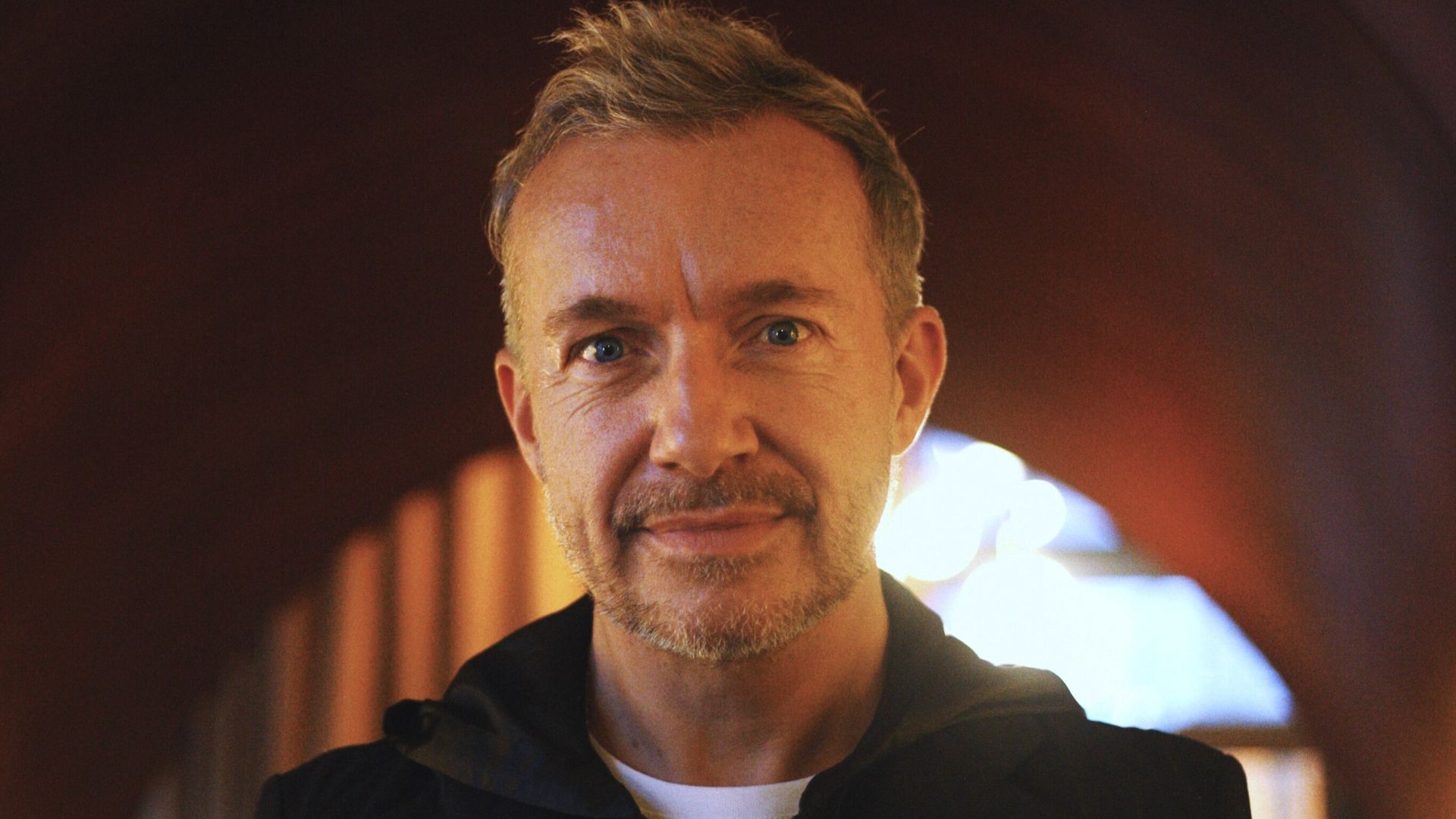Fraser T Smith is the producer you want on speed dial to make a hit. His CV of collaborators reads like a who’s who of chart-toppers, award-winners and A-listers, from Adele, Sam Smith and Drake, to Britney Spears, Kylie Minogue and Idris Elba, while his work with Stormzy, Kano and Dave has helped push the sound of UK rap and grime.
We speak on Zoom, chatting about this year’s Glastonbury festival and the electric headline sets from both Dua Lipa and Coldplay. He worked with both during lockdown, when they were among 24 acts he brought together, along with Dave Grohl, to fundraise through a cover of Foo Fighters‘ Times Like These.
Looking at other British acts that have topped the bill in the past few years – Ed Sheeran, Florence And The Machine, Kasabian, as well as Stormzy and Adele, and you can see a Smith-shaped pattern.
He laughs a little at the suggestion. “I feel incredibly grateful to know so many of these great artists I have been working with,” he replies. Music’s most in-demand producer is softly spoken and unassuming, quick to credit others for their successes.
He describes the moment during Stormzy’s 2019 set, when the star was joined by Coldplay’s Chris Martin for Blinded By Your Grace, Pt 1, as one of many “pinch me” moments of his career.
“You never really write a song going, let’s envisage this doing this, or winning awards or going to number one. When you then fast-forward to moments like that… hang on a minute, we wrote this around like a simple keyboard and acoustic guitar, and now Chris Martin’s playing the chords to it and Stormzy’s singing it in front of, well, 100,000 people, but also millions around the world. It is just mind-blowing.”
For years, Smith has been the genius behind the scenes, quietly lending his talents as a producer and songwriter for the industry’s biggest stars, never hungry for the spotlight himself.
He has co-written, mixed and produced seven UK number one singles, two Billboard number ones in the US, and contributed to 18 chart-topping albums. He is also a Grammy winner thanks to his work on Adele’s second album, 21, and a three-time Ivor Novello winner through collaborations with Dave.
In 2020, he ventured out of the shadows as Future Utopia, releasing a concept album of collaborations titled 12 Questions, featuring the likes of Stormzy, Dave, Kano and Elba. For that one, he felt like “conductor of the orchestra”. Now, the follow-up, Django’s High, puts him front and centre stage as lead vocalist for the first time.
“As much as people know me for collaboration and know I’ve collaborated with a lot of great people in the past, I really felt like I wanted to this album to have the stamp, the identity on it, which was very much ours,” he says.
It took a while for Smith to believe in himself as a singer and frontman. The record, which he describes as “a psychedelic Spaghetti Western”, was executive-produced by Kasabian’s Serge Pizzorno, who gave Smith “confidence and tips on my vocals”.
“I started sketching vocal melody ideas, maybe for someone else to sing,” he says. “I’ve worked with so many great singers, like Adele and Sam Smith, I find it hard to think of myself as a singer at this point.” He checks himself quickly. “I don’t want to put people off because I’m really proud of my vocals on there and I definitely have got good melody ideas. But I also love this kind of multi-layered sound of harmonies and I worked with an amazing artist called Molly J, who sings backing vocals.”
The result is a “mesh of harmonies”, he says. “I’m not professing to be Lewis Capaldi, but… I’m very proud of this record and I really hope people enjoy it.”
After performing a 12 Questions show on stage with collaborators including Kojey Radical and Simon Armitage, Smith discovered a taste for being on stage in front of a crowd. He’s a fan of the immersive experience, performers communicating “with the audience as one, rather than it being the typical sort of icon on the stage and everyone else beneath”.
Crowd-surfing might be a step too far, though. “I don’t know about crowd-surfing necessarily,” he laughs, “but I’d love to feel that we could do a gig that was in the round, you know, the way Taylor Swift does those gigs and it just incorporates everyone into the whole journey. You never know, I might crowd surf… I dunno, it always looks a bit dangerous. What if people drop you?”
As someone who has worked in the background for so long, Smith is vocal about some of the biggest issues affecting the industry. On streaming and artists being paid enough for their work, he says this is an even bigger problem for songwriters and producers behind the scenes.
“Songwriters are typically not going out and touring, not getting the branding deals and not doing the corporate shows,” he says. “I feel very passionately that the songwriters of these amazing songs, the co-writers and the teams of writers, are looked after, or else this will become something of a dying art – or an art which is, equally as dangerous, excluding the working classes and it just becomes a privilege for the upper classes”.
Streaming has levelled the playing field and taken away industry “gatekeepers”, he says, which is “fantastic… I like the fact creativity is open and anybody can create”. However, if artists are being paid “pennies” it becomes “an untenable situation… we want to make sure new talented young bands can actually keep going and they’re not having to necessarily be in the back of a transit van [touring] for, like, 10 years before they’re even making minimum wage”.
On artificial intelligence, which has led to artists including Billie Eilish, Nicki Minaj and Jon Bon Jovi demanding more protection in recent months, Smith describes it as “a really big wake-up call”, but believes it has led to many performers working harder to shift away from music that sounds synthetic.
“If we don’t start getting back to music which sounds more conscious and more organic, ie played by real people, then I think we are in danger of… it’s almost like pop will eat itself,” he says. “Certain techniques in the studio make it very easy for you to come up with music very quickly, but that just sounds like AI music.
“We can see through the popularity of artists like Taylor Swift – and Dua Lipa’s new album to me sounds way more organic and way more heartfelt than the albums before, which have been fantastic but have sounded quite airbrushed. I think there’s a rawness to this new record which people seem to be really resonating with, and people are still rushing out and buying vinyl, people are still into bands – not just bands that have had success in the past, new bands like Fontaines DC or Last Dinner Party, there’s a popularity within a rawer kind of more human sound.”
So AI could be a good thing, he says. “Because in the long-term, we’re all going to be making music which hopefully taps deeper into the well of human emotion, which is something AI will never be able to replicate.”
As well as Future Utopia, Smith is still producing. Current projects include “an incredible record” by spoken word performer and poet Kae Tempest – “which I don’t want to say too much about, but I think one of the incredible things for a producer is being able to join forces with an artist where it feels like that artist is just going to absolutely have their moment” – and music with Bridgerton star and “amazing” artist Simone Ashley.
“I think you are what you eat in a way and I think I grew up listening to so many different genres,” he says. “I love this melting pot of different influences and genre.”
Django’s High, by Future Utopia, is out now








